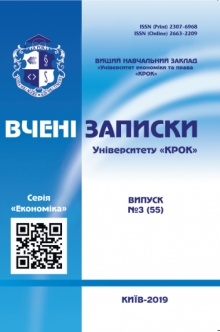uk-UA
en-GB
Компетенція і компетентність: консенсус
Данченко О.Б. д.техн.н., професор кафедри бізнес-адміністрування та управління проектами, завідувач кафедри бізнесадміністрування та управління проектами, Університет «КРОК»
Поскрипко Ю.А. к.е.н., доцент кафедри бізнес-адміністрування та управління проєктами, ВНЗ «Університет економіки та права «КРОК»
У статті визначено причини термінологічної неузгодженості і розбіжностей у тлумаченні понять «компетенція» і «компетентність», які виникають внаслідок розбіжностей в англомовних джерелах, некоректного перекладу та суб’єктивного тлумачення цих термінів з англійської мови. Досліджено сутність та зміст наукових категорій «компетенція» і «компетентність» обґрунтовано раціональний підхід до коректного розуміння їхньої сутності та змісту, та надано їхні дефініції. Фахові компетенції – це знання, навички та вміння з фаху, які повинні відповідати визначеним вимогам до практичної діяльності за цим фахом. Компетентність визначається як наявність специфічних фахових компетенцій, неспецифічних особистісних компетенцій, установок і досвіду з певного фаху (напрямку діяльності) та вміння правильно і своєчасно їх використовувати у процесі фахової діяльності з метою досягнення фахових цілей та розуміння фахових перспектив. Термін «competencies» вживається переважно для опису визначених вимог до роботи, діяльності, посади, кандидатів на посаду тощо, а також опису того, яким чином і на якому рівні ці вимоги повинні бути реалізовані. Процес розвитку компетенцій і формування компетентності автори представили у вигляді «Піраміди компетентності», основними елементами якої ієрархічно є: на базисному рівні: специфічні «фахові» компетенції – знання, навички, вміння та неспецифічні «особистісні» компетенції – індивідуальні, командні (групові) та організаційні; на середньому рівні: установки – цільові, ціннісні та мотиваційні; і на вищому рівні: місія (покликання), візія, які реалізуються через фаховий досвід, потенціал та фахову досконалість (професіоналізм, майстерність, експертний рівень). Авторами зроблено висновок, що детальний аналіз понять «компетенція» і «компетентність» та наведені аргументи дозволяють дійти консенсусу щодо дефініцій, тлумачення, розуміння сутності і змісту, їх співвідношення і розмежування, що дасть можливість уникнути подальших розбіжностей і протиріч у цьому питанні.
Ключові слова: компетенція, компетентність, «Піраміда компетентності», установки, місія, вища освіта.
Competence and competency: consensus
Danchenko O. doctor of technical sciences, professor of business administration and project management, head of the department of business administration and project management, «KROK» University
Poskrypko Y. PhD (economics), associate professor of project management and business administration department, «KROK» University
The article identifies the causes of terminological inconsistency and disagreement in the interpretation of the terms "competence" and "competency" that arise as a result of disagreement in the English-language sources, incorrect translation from English and subjective interpretation of these terms. The essence and the meaning of the scientific categories "Competence" and "Competency" were investigated, a rational approach to the correct understanding of their essence and meaning is substantiated and their definitions are given. Professional competences are the knowledge, skills and abilities in a speciality that must meet the specific requirements for practical activities in this profession. Competency is defined as a presence of specific professional competences, non-specific personal competences, attitudes and experience in a certain profession (activity) and the ability to correctly and timely use them in the process of professional activity in order to achieve professional goals and understanding of professional prospects. The term “competencies” is used mainly to describe certain job requirements, activities, positions, candidates for the position, etc., as well as a description of how and at what level these requirements should be implemented. The authors presented the process of developing competences and competency formation in the form of a “Pyramid of Competency”, the main elements of which are hierarchically: at the basic level: specific “professional” competences - knowledge, skills, abilities and non-specific “personal” competences - individual, team (group) and organizational; at the average level: attitudes - goal settings, value attitudes and intrinsic motivation; and at the highest level: mission, vision, which are realized through professional experience, potential and professional excellence (professional mastery, expert level). The authors concluded that a detailed analysis of the terms “competence” and “competency” and the given arguments allows reaching a consensus on definitions, interpretations, understanding of the essence and meaning, their relationship and differentiation, which will allow avoiding further differences and disagreements on this issue.
Keywords: Competence, Competency, "Pyramid of Competency", attitudes, mission, higher education.

